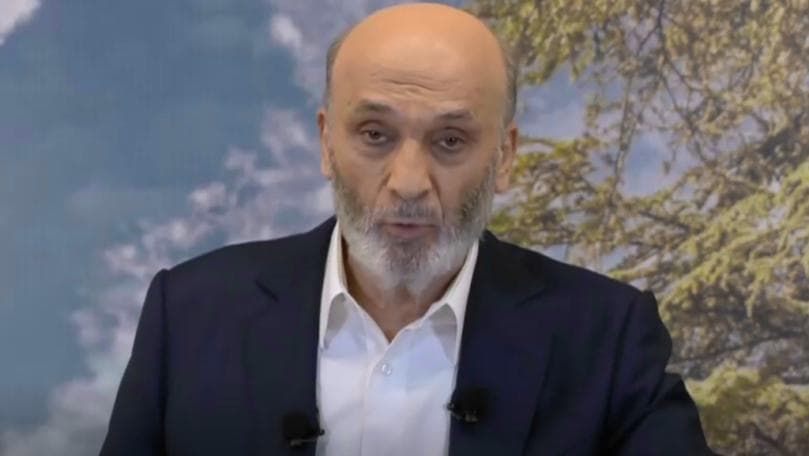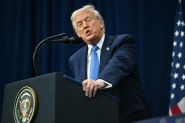
The leader of the Lebanese Forces, Samir Geagea, stated that a return to the status quo ante is "out of the question" once the war between Hezbollah and Israel is over, calling for the election of a president of the Republic and the formation of a government capable of rebuilding the state.
In this context, he called on the Speaker of House Nabih Berri, urging him to play a pivotal role in this direction.
"The choice of a colorless, odorless, and flavorless president, who is incapable of making decisions and implementing international resolutions that allow Lebanon to regain its sovereignty, will be a crime against the country," asserted Samir Geagea during an interview he gave on Monday evening to MTV.
Geagea firmly expressed his opposition to the selection of a "consensual or centrist" president, a formula that he believes has become "fashionable" but cannot, in any way, contribute to the building of a state, he explained.
A theme that Geagea repeatedly emphasized during his interview to explain that it would be "criminal towards Lebanon and the Lebanese" to apply, in politics, the same recipes that have plunged the state into the decrepitude it currently faces and led it into a destructive war. "Consensual or centrist figures do not want to take a stand. This is a real catastrophe. Some are afraid. Others do not want to offend certain parties, and a third category has its calculations," he lamented.
In the same vein, he believed that the profile of the new Prime Minister, just like the composition of the ministerial team, should correspond to the same criteria on which a head of state would be elected.
Samir Geagea framed the conference he organized on Saturday in Meerab within this desire for change, emphasizing that his only goal was to propose a roadmap for rescuing Lebanon. "It was not about mobilizing the MPs or forming a front," he said, explaining the absence of many opposition figures. According to him, the aim of these meetings was primarily to break the political stalemate prevailing in the country while war rages on its territory.
In response to a question, he mentioned reservations expressed by Druze leader Walid Joumblatt regarding the FL roadmap that was submitted to him. "He believed that we had set the bar too high and that he could not follow," revealed Geagea. "However, this roadmap aligns with what we have been calling for for years. If the war ends, there is no question of returning to the status quo ante that has led us to this war. Lebanon will not survive," he warned.
The Ain el-Tineh Meeting
Samir Geagea vigorously rejected accusations from his detractors, claiming that he is betting on an Israeli victory to initiate political change in Lebanon. "We have been demanding the same things for years," he asserted, criticizing the Christian allies of Hezbollah, particularly the leaders of Marada, Sleiman Frangié, and the Free Patriotic Movement, Gebran Bassil, who, according to him, "speak on command." He vented against those who have supported Hezbollah for self-interested reasons, stating, "On the other hand, we have seen where their positions have led the country. They have their calculations, hence the attacks against the FL."
In response to another question, he dismissed any comparison between the Meerab meetings and the tripartite meeting in Ain el-Tineh, during which Berri, surrounded by caretaker Prime Minister Najib Mikati and Druze leader Walid Joumblatt, called for a ceasefire and the implementation of UN Security Council Resolution 1701.
According to him, it is too late to demand the implementation of this resolution. "If it had been done three months ago, (Hezbollah leader) Hassan Nasrallah and the command of this organization would still be alive," he noted.
But for Samir Geagea, "it is no longer possible today to resolve the problem halfway and certainly not with the same old recipes."
He maintained that the implementation of Resolution 1701 must be accompanied by the implementation of Resolution 1559 on the disarmament of Lebanese and foreign militias in Lebanon.
In this context, he recalled that former assassinated Prime Minister Rafic Hariri, one of the architects of Resolution 1559, along with French President Jacques Chirac, had "realized that he could not build the country in the presence of illegal weapons."
However, Samir Geagea pointed out that the disarmament of Hezbollah does not imply the disappearance of this organization, "which will continue to play a political role like other Lebanese parties."
At the same time, he advocated for support for the Shiite community so that it could reintegrate into the state. "We do not want the Shiite community to be defeated, but we want all of Lebanon to be if Hezbollah maintains its weapons," he stated, insisting that "the interests and survival of this community depend on those of Lebanon."
Hence, he underscored the importance of initiating a whole process that must begin with the election of a head of state and end with the issue of illegal weapons so that the army can extend the sovereignty of the state over the entire territory.
In this regard, Samir Geagea noted that "the only period during which the residents of Southern Lebanon were securely spanned from 1949 to 1965 when the army was deployed in that region." "In 1965, the Palestinian factions arrived in the south of the country and destroyed it," he recalled.
He also addressed Nabih Berri, asking him to "crown his political life with a different act." "He needs to declare that enough is enough and work to restore the Lebanese state to its former glory and contribute to its rebuilding," Samir Geagea insisted, expressing his support for the election of the commander of the army, General Joseph Aoun, as head of state. However, he noted that this should be conditional on knowing his political program.



Comments